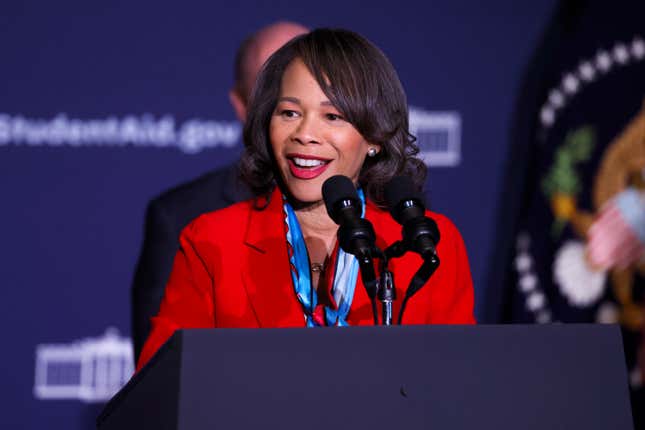
For the third time in our nation’s history a Black woman was sworn into the United States Senate. But Congresswoman Lisa Blunt Rochester (D-DE) and Prince George’s County Executive Angela Alsobrooks say one isn’t enough.
“Everybody’s talking about, there are no Black women in the Senate,” Rep. Rochester told the crowd at the annual Emily’s List Conference in New York. “Now there’s one, but there needs to be 2,3,4,5.”
Rep. Rochester and County Executive Alsobrooks, who joined Rochester on stage alongside Maya Harris, are both running to become their state’s first Black Senators in Delaware and Maryland respectively.
In moving personal stories, both candidates shared their reasons for running. “I was inspired to run for office initially in 2010,” shared Alsobrooks about her decision to run for State’s Attorney. “I have a four year-old daughter and at the time, I believed that she was growing up in a community less safe than the one I had grown up-in.”
Alsobrooks said she remembered talking to a friend about her concerns, who said, “unless you plan to change it, let’s never discuss it again.” Alsobrooks said in that moment she decided to run. She won and served two-terms as State Attorney before running for Prince George’s County Executive.
Rep. Rochester’s path, on the other hand, was filled with the tragedy. In 2014, the love of her life, her second-Husband, Charles Rochester, passed away from a blood clot to the heart. “And for that whole year, just getting-up in the morning was a feat,” she says. “And then, on the anniversary of Charles’ passing, I saw a dad in the supermarket in front of me with three kids, put back grapes because they were $9.”
In that moment, Rep. Rochester, says she realized that she had so much and that the people of her state were struggling. With the help of Emily’s List Rochester ran for office, becoming the first woman and the first African American to represent Delaware in Congress. Now, if elected, she’d make history all over again in the Senate.
“In the Senate we have the ability to make change,” she says. “To say a Supreme Court needs to be ethical, needs to represent us, and we can fight for our bodily autonomy.”
It’s worth noting that Rep. Rochester, and County Executive Alsobrooks, face vastly different races. The retiring Delaware Senator Thomas R. Carper hand-picked Rochester as his successor, and she will not face a primary. Alsobrooks is currently the favorite in her race, with key support from the Democratic establishment, but she still faces a primary, where her criminal justice record could come into play.
Last month, the Intercept wrote a story digging into Alsobrooks record as prosecutor, un-earthing moments that could emerge during her primary race.
During past campaigns for Prince George’s state’s attorney, Alsobrooks positioned herself as staunchly “tough-on-crime.” In addition to pushing the notion that cannabis decriminalization led to drug dealers murdering each other, she has supported DNA collection of people without criminal convictions, putting police in schools, and harsh penalties in a variety of situations, among other positions opposed by justice system reformers.
Alsobrooks and Rochester also are not the only Black women running competitively for Senate in 2024. Congresswoman Barbara Lee (D-CA), who many thought could be appointed as the late-Senator Feinstein’s replacement, is currently battling it out in a heated primary.
These three races open-up the possibility that there could be more than one Black woman in the Senate at the same time for the first time in our nation’s history.

